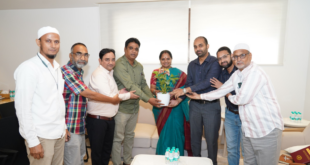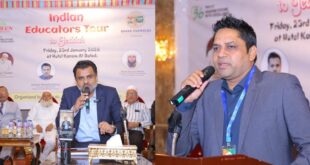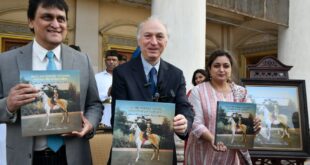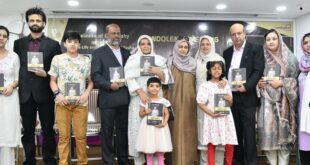An in-depth look into the Minority Residential Schools of Telangana State
Hyderabad was the only state (now city) that saw uninterrupted Muslim rule in India for over 800 years. Not even Delhi, which is considered home of the Moghuls, comes this close. Due to the robust and visionary Muslim leadership that built great architectural structures – many of which centuries old yet existing – and their generosity in donating properties for Wakf. There are more than 33,000 odd Wakf properties in India’s youngest State of Telangana, amounting to a total value of a whopping Rs. 1,46,000 crore rupees. The Telangana State government is harnessing this architectural wealth, utilizing a small number of these properties, to empower people through education.
When the Telangana Minorities Residential Educational Schools were established in 2015, Chief Minister of the State Mr. K. Chandrashekhar Rao, Dy. Chief Minister Mr. Mahmood Ali, and Minister of Education K. Srihari actively participated. Director General of Anti-Corruption Bureau and the former commissioner of Hyderabad Police Mr. A.K.Khan IPS was tasked with the role of TMREIS Director while Secretary of Minorities Welfare Department Syed Omer Jaleel IAS supported the endeavour. Mr. B. Shafiullah IFS, a 2003-batch IFS officer, appointed as the Secretary.
The government had originally planned to set up 71 minorities residential schools. Within a year of establishment, word about the upscale quality of education and standard of living spread at light-speed. Well-dressed and shining school uniforms, well-groomed children, their upscale social conduct and good mannerisms, witnessed by the people around them during their vacation, left the people impressed. The government used its marketing prowess albeit a little to promote these schools. As a result, an astounding number of applications were received by the government, and it decided to double the number of these schools.
Telangana Government Schools – Largest In Country
Today, the Telangana State government, with over 206 institutions – 204 schools and 2 junior colleges, perhaps has the largest number of minority residential schools in the country, replete with all facilities including lofty buildings, big playgrounds, high-class hostels, delicious food designed by the National Institute of Nutrition, and much more.
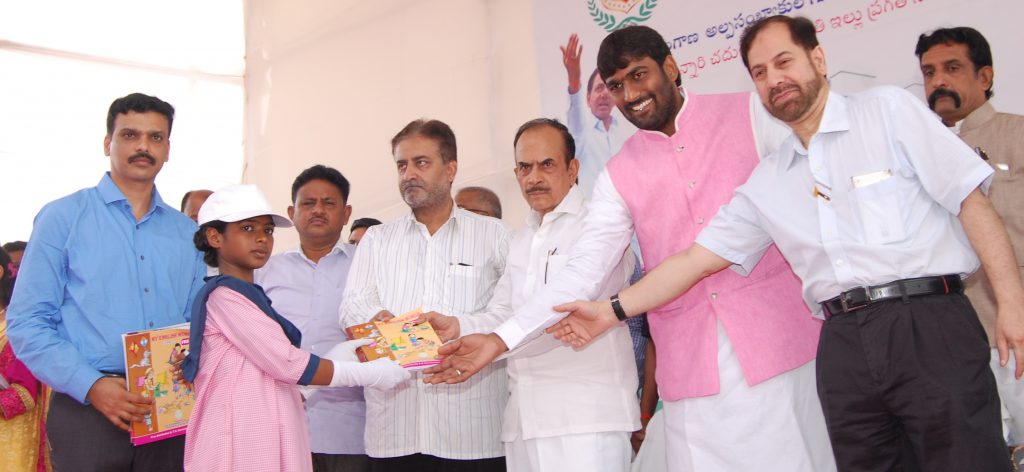
About 4000 crores is spent only on the TMREIS school’s construction, and expenditure on teachers, staff quarters, etc. In areas where more time is required to set up such infrastructure, the department is leasing existing buildings befitting its criteria for these schools, and utilizing them by paying their owners rent approved by the district collector after site assessment.
According to Mr. A.K.Khan IPS Retd., “the state government is unwilling to compromise in delivering quality education”.
He observes, when the head of the State, “the Chief Minister himself, has demanded the best to be delivered to the State in terms of education, quality living for these institutes, the orders are naturally very smooth to implement with internal administrative friction at bare minimum.”
He believes, no state can implement such education policy successfully unless the orders come straight from the Chief Minister. There is a difference between paper work and actual implementation. “The CM is extremely supportive and has taken great interest”, he adds.

Autonomous:
For the same reason, the “TMREIS is built to be an autonomous society, and therefore cannot be influenced politically”, says the Director A.K.Khan. Its teachers are different from government teachers, in the sense they follow a separate decorum and rules crafted by the TMRIES. The government will only recruit teachers for TMREIS schools through an exam conducted by the Service Commission, this will help keep away the political references and influence over selection of teachers, thus ensuring only qualified and able teachers are recruited, and not by references.
These teachers will have a starting salary of Rs. 42,000 for teachers in Hyderabad-based schools, and over 70,000 for the post of Principal. With a requirement of nearly 7000 teachers to cater the projected 1,33,000 students in 204 schools, the department will be spending quite a fortune. On the other hand, the cost incurred on each child on food among other things – excluding infrastructure – is Rs. 65,000 annually.
Perspective Change:
According to Mr. Khan, the whole perspective of the government schools in Telangana among the general public will change – and it’s already happening. With the government aiming to set up playgrounds for football, cricket, horse riding areas, swimming pools and more in these institutions, these government schools which were looked down upon until now, will be on par with the best of their corporate peers, believes Mr. Khan. For summer camps, sports such as sailing, boxing, tennis, etc. are also being planned.
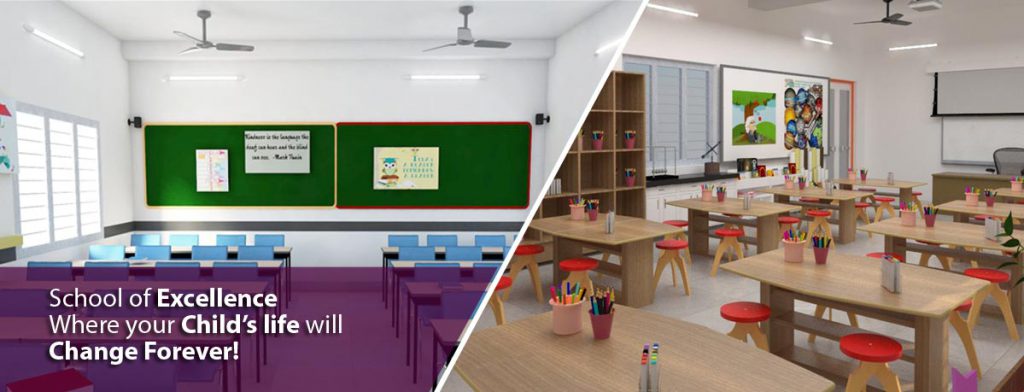
Inclusive Culture:
Interestingly, 25% seats in these schools are reserved for non-minority students while the 75% seats are reserved for students from the minority communities of the state. This will help boost the inclusive culture, and instil a sense of cultural harmony and peaceful coexistence among students – right from their early years in life. When these students grow up, they will carry these values of peaceful coexistence habitually. The schools are meant for “high quality secular education”, and moderate aspects of their respective religions are also taught to these students.
Besides for these residential schools, the government is dispersing nearly 350 crores in the form of pre-matric and post-matric scholarships, in addition to central government scholarships one can avail by applying at these stages.
Telangana Overseas Scholarships:
While the State does have government-run colleges, it may take a while for them to be built on standards set by the TMREIS. Meanwhile, to help students accomplish their goals of overseas education, the State Government’s Minority Welfare Department is extending a scholarship of Rs. 20 lakh (Rupees 2 million) to each student interested in pursuing education in United States, Canada, Britain and Australia. The scholarship amount is directly remitted into the bank account of applying student in systematic instalments, and upon production of necessary proof documents.
Mr. A.K.Khan, who is the mentor to hundreds of Civil Service aspirants across India, particularly across Telangana, and has delivered numerous lectures on Civil Services, believes that Hyderabad has great potential when it comes to Civil Services. The city stands 2nd in terms of civil services next to Delhi in the whole of India.
Civil Services Candidates from Telangana:
This year, more than 70 students from Telangana State have achieved success in Indian Civil Services, the country’s most prestigious exam organized by UPSC, and there is ardent support from the government to push for Civil Services, including setting up of Study Circles at different geographical strata and establishing a coaching centre at Maulana Azad National Urdu University of which Mr. Khan is a mentor.
Telangana Minorities Finance Budget:
Behind these bundle of generous sanctions in various forms is the Telangana State Minorities Finance Corporation (TSMFC) – the financing wing of the State government, which currently has the country’s largest budget at 1249.66 crore rupees for minorities allocated to any state. The state’s budget has increased despite its disturbing bifurcation from erstwhile Andhra Pradesh.

Mr. B. Shafiullah, a 2003-batch IFS officer is the Managing Director of the TSMFC. The department has earmarked a budget of 150-cr to fund aspiring entrepreneurs from the minority community of the state. These sanctions fund finances for the self-employment projects of the financially underprivileged. Thousands of applications from across the state are received every year by the government, and thousands are granted these funds. About one-third of this 150-crore fund is dedicated for women empowerment, as part of government’s inclusive policy.
What Telangana Chief Minister Wants:
Perhaps, this is the first time in the country that minority welfare schemes are being implemented so diligently. Implementations are light-speed, and the chain of command follows from the Chief Minister himself to the department officials down to the last level, including the collectors at every district. Some charitable organizations too like the 25-year strong Hyderabad Zakat and Charitable Trust has helped state government in implementing this schools project at district level.
The administrative machinery is seen in relentless action, whether at schools or the administrative office at Banjara Hills where tens of officials check with almost every school periodically for any problems, devise operational strategies, conduct quality checks, document progress and complaints, if any, handle recruitments and take care of other background chores. For certainly, handling 5,000 employees scattered across the State in a government-aided project is a herculean task.
According to Mr. Khan, despite barely 2 years in existence, the TMREIS is becoming an exemplary body for many states in the country. States like Bihar, Bengal, Delhi are interested, and some are even implementing minority welfare schemes inspired by Telangana State.

Even as this detailed interview was drawing to a close, a group of individuals from Manipur showed keen interest in the State’s education policy. One person, a trainer and self-acclaimed close-aide of the Manipur Chief Minister even said “the Chief Minister of Manipur has asked up to study the education policies of different states to come up with our own, and Telangana seems to be particularly an interesting state to study about.”
Secretary of TMRIES Mr. B. Shafiullah IFS has taken special interest in perfecting these implementations. The 2003-batch IFS officer constantly shuttles across various locations scouting for ideal locations to set up these schools with his team and the director. Sometimes, his day starts with the break of dawn, and lasts past 7 in the evening.
This includes attending scores of people walking into the administrative headquarters oozing with queries, carrying applications and some even seeking jobs and monetary assistance. At such moments, one can see compassion taking precedence over pride and attitude, and they are generally answered after a careful but prompt case study.
53,000 students are studying in these institutions currently, and the number is set to increase gradually.
The article is first in an exclusive series on Minorities in Telangana State by Gawah Weekly. Keep watching this space for more.
 Gawah (The Witness) – Hyderabad India Fearless By Birth, Pristine by Choice – First National Urdu Weekly From South India – Latest News, Breaking News, Special Stories, Interviews, Islamic, World, India, National News
Gawah (The Witness) – Hyderabad India Fearless By Birth, Pristine by Choice – First National Urdu Weekly From South India – Latest News, Breaking News, Special Stories, Interviews, Islamic, World, India, National News

